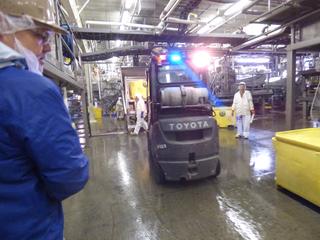Faced With Min. Wage Hike, Seafood Plants See Room to Cut

Tuesday, November 04 2014
Alaska's minimum wage initiative flew mostly under the radar this fall, overshadowed by high-profile Congressional races. But ballot measure three proposes a big change to state's minimum wage structure -- increasing it by two dollars over the next two years, to $9.75 an hour. After that, it would be adjusted for inflation.
In Unalaska, at least 83 percent of voters supported that plan. The seafood industry -- which is the biggest source of minimum wage jobs in Unalaska -- didn't expect anything less.
Leading up to the election, they were already considering ways to scale back their workforce.
"We'll have people who, as they retire out of the industry, we just won't replace them," says Alyeska Seafoods plant manager Don Goodfellow. "Machinery will take over a lot of those jobs."
Eventually, Goodfellow thinks up to 30 percent of Unalaska's processing workers could be automated. He says the seafood business is well overdue to make that kind of change.
"I think we've already started and it's not as a response to that bill, specifically," he says. "It's the need to be more efficient about how we do things."
At UniSea, the potential wage hike makes that need more urgent. Chris Plaisance is a human resources director for the company. If they had to implement the pay increases laid out in Tuesday's ballot initiative, it could cost up to $3.5 million.
"Our margins are so thin that we need to make improvements or we’re gonna have a problem," Plaisance says.
UniSea would need to trim its workforce. Instead of layoffs, Plaisance says they would leave entry-level jobs empty at the end of each season. That leaves room to keep employees who've been with the company the longest.
Levell Curtis Standifer, Jr. has been working for the company almost year-round since 2010. He’s originally from Washington State.
"Down in the Lower 48, the economy is real bad," he says. "And I thank God for the state of Alaska, and how they create fishing jobs."
Standifer and many of his coworkers start out earning minimum wage. But they have ample opportunities to work overtime. Plus they receive free room, board, and transportation from UniSea.
Still, Standifer thinks his employer can afford to pay a little more.
"The fishing companies, they’re doing quite well off our labor," he says. "That’s the bottom line."
Judging by preliminary tally, he wasn't the only one that felt that way. And he certainly wasn't the only UniSea employee at the polls. Once an hour, the processing plant trucked in employees to cast their votes -- and possibly, set their pay.
KUCB's Lauren Rosenthal and Annie Ropeik contributed to this report.



